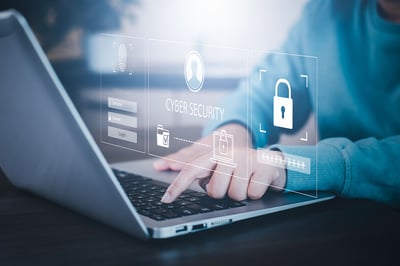 So much of our lives is connected online these days, and freelance medical communicators are using tools that allow collaboration with colleagues around the world.
So much of our lives is connected online these days, and freelance medical communicators are using tools that allow collaboration with colleagues around the world.
This level of connectivity requires attention to cybersecurity to make sure data and key information are accessed only by people who are authorized to see them. As a medical communicator, what can you do to protect yourself, your personal data, and your clients’ critical information from cyberattacks?
What Are Cyberattacks?
Cyberattacks occur when someone accesses a computer, phone, gaming system, or other device that is connected to the internet or Bluetooth. These attacks can compromise sensitive personal information or lead to identity theft.
These malicious attacks could also cause you to lose access to your information or accounts, jeopardize your reputation with clients, or affect your ability to complete your projects.
A Rising Threat
Unfortunately, cyberattacks are growing more frequent. According to an article in Forbes, 34.5% of executives in one poll reported that their organizations’ accounting and financial data were targeted by cyber attackers.
The costs of coping with cybercrime are monumental. Cybersecurity Ventures estimates that the costs related to cybercrime will approach $8 trillion in 2023 and $10 trillion by 2025.
“Cyber criminals are already using AI and machine learning tools to attack and explore victims’ networks,” the article states. “Small businesses, organizations, and especially healthcare institutions who cannot afford significant investments in defensive emerging cybersecurity tech such as AI are the most vulnerable.”
Protecting Against Cyberattacks
Ready.gov has some tips for protecting against cyberattacks.
-
Limit personal information shared online. Pay attention to privacy settings, and don’t share your location.
-
Keep all your software and operating systems up to date.
-
Create strong passwords, change them often, and use a password manager and two types of verification.
-
Beware of offers that sound too good to be true or anyone requesting personal information. When in doubt, don’t click.
-
Use a secure internet connection and Wi-Fi network.
-
Back up files in an encrypted file or encrypted file storage device.
Cybersecurity for Medical Communicators
The AMWA webinar Tools To Thrive in a Digital World, Part 2: Digital Security, Data Access, and Travel, explores cybersecurity issues for medical communicators, including data storage, access, backup, file sharing, and strategies for remote work and travel. The webinar also offers some options for passwords, logins, and phone security.
Data Storage and Access
Where do you store your data? If all your data are on a hard drive that fails, you lose everything. However, if your data are stored in the cloud, you need internet access to get that data. Cloud storage does have a cost, but for many, paying someone else to maintain your data is worth it. You don’t need to worry about backing up your laptop to your desktop or fussing with the backup systems of the past.
When it comes to sharing and collaborating on files, there are a number of options such as Dropbox, Google Drive, WeTransfer, OneDrive, and iCloud Drive.
Backup Strategies
Data backup is different from storing your data in the cloud. Online data storage does not protect against user errors such as accidentally deleting files. If you are sharing data on Dropbox or a similar service, someone else could delete your file. Bolt says a backup strategy means keeping separate copies of your data so you can always retrieve a previous version.
Many people opt to connect a network attached storage (NAS) drive to a router. Anytime a computer is plugged in, the NAS device will back up the data.
Another option is to purchase a plan from a company like Carbonite or Backblaze, which is a reliable way to back up data, but it can be expensive.
Data Security While Traveling
Public Wi-Fi networks can be breached, so it’s important to understand the basics of encryption. Using a virtual private network (VPN) protects users by encrypting data and hiding their IP addresses. VPNs allow for privacy, but some places will not allow you to use them.
If they are working in public places and connecting to the internet, travelers need to be aware of the potential security compromises. Of course, if you are working with sensitive data, it’s even more critical to use a VPN.
Tips for Passwords and Logins
Billions of people around the world have been victims of security breaches, and login information is our identity, so it is critical to protect passwords, logins, and phones. In the webinar, a few tips are provided for keeping this information secure.
- When creating a password, consider stringing together random words or generating a complete phrase.
- Don’t reuse passwords.
- Use two-factor authentication whenever possible. That’s when you have a code texted to your phone before you can log onto a website.
- Consider investing in a password manager like LastPass or Dashlane.
Phone Security
Our phones contain much of our lives, so they should always be protected. That means locking your phone using either a PIN or a face ID. Don’t leave phones sitting out, and always keep your phone’s operating system updated.
Speaking of updates….
Update, Update, Update
Finally, always make sure your computer’s operating system, your software, and your phone are updated. When a security vulnerability is found, the manufacturer will send an update, but the updates are useless unless they are installed.
Resources for a Secure Digital Workplace
If you are looking for more detailed information on staying safe from cyberattacks, the following sites have useful information.
- Department of Homeland Security’s Cybersecurity and Infrastructure Security Agency
- Cyberattack Information Sheet (PDF)
- DHS Stop.Think.Connect.™ Campaign
We are living in a changing world, and technology is making our lives and workplaces more connected. The flip side of this convenience and connectivity is the vulnerability we face when our devices and data are not fully protected.

